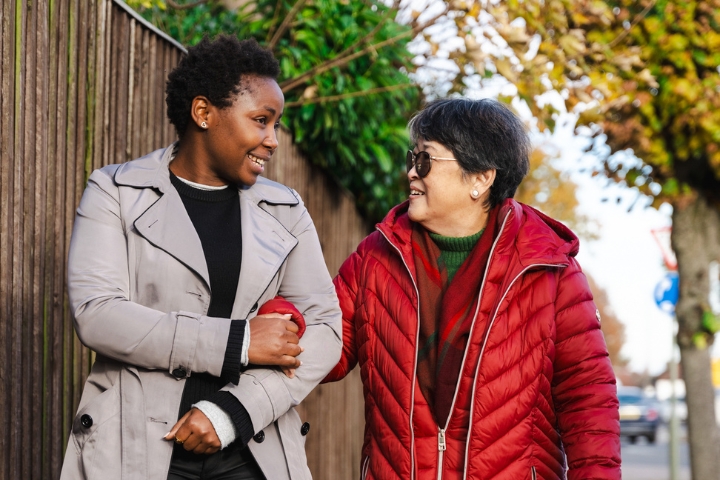
National Office
Please enter the office location/term above to receive results for your closest office as well as information matches
Historically, care for older individuals in Asian families has been driven by close family ties and the tradition of family caregiving. Seeking external help was often seen as conflicting with cultural values that prioritise familial responsibility. However, as lifestyles and social dynamics evolve, attitudes are gradually shifting, leading to greater acceptance of professional home care services.
At Radfield Home Care Watford & Borehamwood, we understand the unique cultural needs of families in our community and offer personalised home care services that align with their values and traditions.
Several cultural factors can influence the hesitation to seek professional care, such as stigma, reliance on informal networks, and cultural traditions. These factors are often rooted in specific relationship dynamics unique to each culture. Here are some key cultural factors that shape attitudes towards professional care:
These cultural differences are critical to understanding how Asian communities approach caregiving and seek help. When culturally mismatched, healthcare services can be underused or less effective. Promoting cultural competence in healthcare settings is key to ensuring that people from all backgrounds receive the care they need.
Younger Generations: Younger Asians, who are more familiar with Western concepts of adult care, tend to be more open to professional services. These individuals are often better equipped to balance work, family, and caregiving responsibilities, making them more receptive to the idea of external assistance.
Acceptance Among Older Adults: Older generations may initially resist the idea of outside help, but as they experience the practical benefits of professional care—especially in cases of chronic health issues or mobility challenges—they may become more open to it. The positive outcomes they experience can shift their perceptions and make them more accepting of professional services.
Modernisation, urbanisation, and migration have altered family structures, with many younger adults living away from their parents for work or education. Smaller family units, geographic distance, and busy lifestyles make it harder for families to provide full-time care for older relatives.
As awareness of adult care services increases, families are beginning to realise that professional support, particularly for older loved ones, those with dementia, or in need of palliative care, can enhance their relative’s quality of life, ease caregiving burdens, and provide peace of mind.
For adult care services to be more acceptable to Asian communities, providers must be culturally competent. This involves understanding the unique needs, values, and traditions of the individual receiving care and their family. Caregivers who speak the same language, respect religious practices, and are sensitive to cultural nuances can make families feel more comfortable with professional assistance.
Promoting cultural competence within healthcare settings is critical to improving treatment outcomes and ensuring individuals from all cultural backgrounds receive the care they need.
Many Asian families prefer home care over institutional care because it allows their loved ones to remain in a familiar environment. Home care providers who respect cultural customs, such as meal preferences, religious observances, and daily routines, can more easily integrate into family life and provide care that aligns with cultural expectations.
Religious Considerations: Religion plays a significant role in many Asian communities, and some families may prefer caregivers who understand and respect their religious practices, such as prayer times or dietary restrictions. This is an important aspect of ensuring that care is sensitive to both spiritual and physical needs.
Home-Based Religious Practices: Many families wish to ensure that their loved ones can continue their religious practices while receiving care, such as observing dietary laws or supporting religious rituals. Home care services can accommodate these practices, making it easier for families to maintain their traditions while providing the care their loved ones need.
Modern home care services are designed to complement family caregiving by respecting cultural preferences and individual needs. Flexible options, such as respite care, companionship, and part-time care, allow family members to remain involved while managing other responsibilities.
Providers like Radfield Home Care understand the importance of family in many Asian cultures. Our care services in Watford & Borehamwood are tailored to respect dietary preferences, communication styles, and other cultural needs, offering reliable support to family caregivers.
Consider the case of Mrs. Patel’s family, who sought help for their 84-year-old mother with dementia. The family wanted her to remain in a familiar environment, surrounded by loved ones. By partnering with Radfield Home Care, they received personalised care that respected their cultural preferences. The caregiver spoke their language, prepared culturally appropriate meals, and engaged Mrs. Patel’s mother in meaningful conversations about her heritage, ensuring she felt comfortable and connected.
This approach not only provided essential care but also allowed the family to maintain their strong bond with their mother, preserving their tradition of family-led care alongside professional support.
The growing acceptance of home care services within the Asian community in Watford reflects a broader trend of blending traditional values with modern caregiving solutions. As families experience the positive impact of these services, home care is increasingly viewed as a valuable partner in providing dignified and respectful care for loved ones.
At Radfield Home Care, we are committed to honouring cultural traditions while providing trusted, compassionate care. By working closely with families and respecting cultural sensitivities, we contribute to this important transition, helping older individuals age with comfort and dignity while maintaining family values at the heart of their care.
If you’re looking for culturally sensitive, personalised care in Watford, Borehamwood, or surrounding areas for your loved ones, get in touch with us today by calling 01923 624 674.
Get in touch with your local Radfield Home Care office today and find out more about the support we offer and the difference we can make.